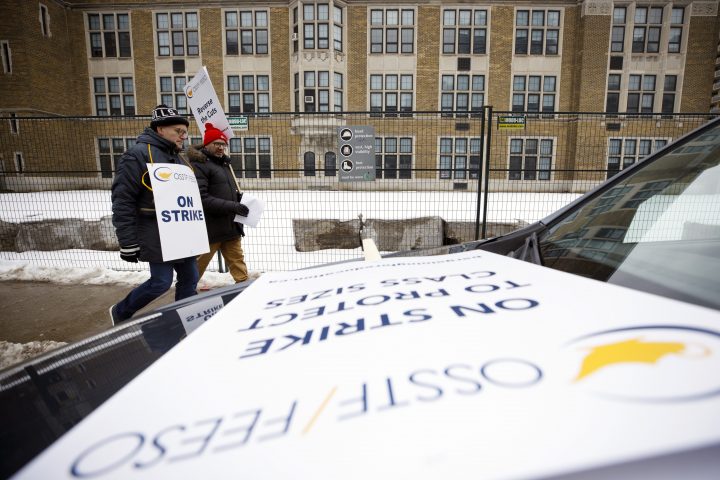The largest local bargaining unit of the Ontario Secondary School Teachers’ Federation has told members it opposes a tentative agreement between the provincial union and the government that would avoid the possibility of strikes.

The OSSTF reached a deal last month with the province that would see the parties keep bargaining for a new contract until Oct. 27 and then send any remaining issues to be settled by arbitration, which would eliminate the chance of a strike by high school teachers.
But the proposal must first be ratified by members, and there were signs of potential trouble as voting on the deal began Friday.
The OSSTF Toronto teachers’ bargaining unit executive sent its members a memo saying they were not directing teachers on how to vote, but were expressing their concerns about entering into binding arbitration and removing the right to strike.
“The ability to strike or withdraw services is one of the cornerstones of the labour movement and has been hard fought over the years,” the executive wrote in the memo.
“To voluntarily give up that right has the potential to set a dangerous precedent for education workers and the entire labour movement.”
The executive wrote that asking teachers to vote on a pathway for bargaining, rather than on an actual deal itself, means they are being asked to accept a deal without knowing the terms.
- TSX flat as oil falls, U.S. stock markets mixed after Fed holds interest rates steady
- Panthers head back to work, resting and waiting for Bruins-Leafs winner
- Proline bettors still solidly behind Toronto Maple Leafs in NHL playoffs
- Ontario introduces sped-up apprenticeship path for high school students
“Pursuing this pathway represents the most significant departure from OSSTF/FEESO collective bargaining orthodoxy ever undertaken by our union,” the executive wrote.
“We are concerned that this might have a serious impact on solidarity, on our capacity to organize our members, and on building collective actions going forward.”
OSSTF president Karen Littlewood said she knew some members would like the proposal and some wouldn’t, but the union will know when voting concludes Sept. 27 what members are thinking.
“I believe as the president, and my executive strongly believes, this is the best possible pathway for us to have a deal right now in September of 2023,” she said in an interview.
If the proposal is rejected, negotiations would continue but the OSSTF would also take a strike vote to see if members want to exert the pressure of possible job action at the bargaining table, Littlewood said.
“We don’t have to end up at an arbitrator,” she said.
“I think it would be wonderful if the government took this as a sign and said, ‘Yeah, you know what, let’s put some substantial items on the table.'”
The central bargaining team met with government negotiators Thursday for the first time since the tentative deal on process was struck and there was “a little bit of movement” at the table, Littlewood said.
Education Minister Stephen Lecce’s office wrote in a statement that the province hopes the OSSTF and all three other teachers’ unions agree to the process that includes binding arbitration.
“While we will respect the ratification process, our government is determined to keep kids in class for the next three years without the threat of strikes,” spokesperson Grace Lee wrote.
The unions representing public elementary teachers, English Catholic teachers and teachers in the French-language system all said they could not consider adopting that process at this time.
Some local union executives have expressed support for the proposed agreement, including a representative for child and youth workers and psychologists in the Toronto District School Board.
The elementary teachers and English Catholic teachers are set to hold strike votes this fall.



Comments